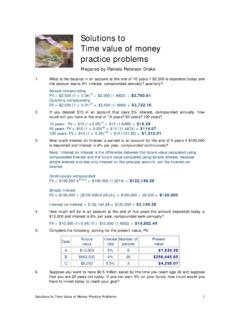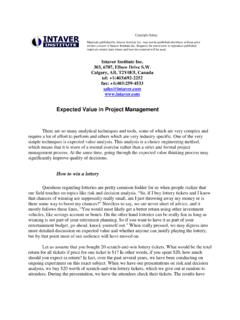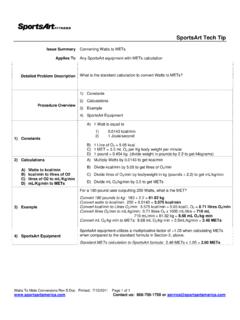Transcription of Value for money and international development ...
1 This paper seeks to address confusion regarding the concept of Value for money (VFM), and promote a more constructive discussion about the relevance and limitations of this concept to development co-operation. It takes as its starting point the broad consensus that development funds should be used as effectively as possible: donor agencies and governments, tax payers, partner country governments and citizens all want aid to work as well as it can and agree that limited aid budgets need to be well targeted and managed. Yet the concept of Value for money in the context of development co-operation has given rise to debate and, in turn, confusion.
2 This paper argues that once this confusion is untangled, it is clear that Value for money is relevant to development co-operation. The challenge then lies in applying it in a productive and pragmatic way so that it can promote development IS Value FOR money AND WHY IS IT ON THE AGENDA? Value for money (VFM) is about striking the best balance between the three E s economy, efficiency and effectiveness1 (Box 1). It is not a tool or a method, but a way of thinking about using resources well. In the United Kingdom it is often used as a framework for assessing cost effectiveness across the public sector.
3 A fourth E equity is now also sometimes used to ensure that Value -for- money analysis accounts for the importance of reaching different Value for money has become more prominent on the development agenda for a number of inter-related reasons. First, the development community has in the past been driven by performance criteria that are very different from those in other areas of public spending: how much is spent sometimes overshadows the more fundamental question of what the funds achieve. Second, aid agencies are increasingly expected to understand and demonstrate the Value for money of their work to those who are paying the bills, tax payers.
4 Third, a number of aid sceptics have claimed that aid does not work, is wasteful and should be downsized or abolished. Although these claims may not always be based on evidence, strong evidence is needed in order to demonstrate that aid is valid and managed well, and that those in charge of aid are constantly seeking to make it work CONFUSIONIll-informed discussion has led to confusion about what Value for money should mean and to what extent it is relevant to development co-operation. Some development practitioners dismiss VFM as not relevant, impractical and even inhumane; at the same time, policy makers want to see clear numerical evidence of the best possible Value for money in all areas of government expenditure, including development co-operation.
5 As is often the case in such polarised debates, the reality is somewhere between the two extremes. The following points must be made to allow VFM to be applied to development co-operation in a useful way. BOX 1: SOME BASIC DEFINITIONSCONCEPTSE conomy: Reducing the cost of resources used for an activity, with a regard for maintaining : Increasing output for a given input, or minimising input for a given output, with a regard for maintaining : Successfully achieving the intended outcomes from an for money : The optimum combination of whole-life cost and quality (or fitness for purpose) to meet the user s requirement.
6 It can be assessed using the criteria of economy, efficiency and analysis: A method to evaluate the net economic impact of a project. Expected benefits are estimated and monetised with inflation accounted for, and offset against project costs. The approach is most commonly used to inform in major infrastructure investment in both developed and developing analysis: This method is used where monetising outcomes is not possible or appropriate, most commonly in health. Common measures include quality-adjusted life years .Source: Adapted from definitions from the UK National Audit Office and the EU Sourcebook on Evaluating Socio-Economic for money and international development : Deconstructing myths to promote a more constructive discussionMAY 2012By Penny Jackson OECD development Co-operation DirectorateThe OECD development Assistance Committee for money is not the same as cost-cutting or Value for money is not synonymous with either economy ( reducing the cost of inputs) or efficiency.
7 Value for money is about finding the right balance between economy, efficiency and effectiveness, and cannot be assessed through only one of these dimensions in isolation. Reducing the costs of inputs and making efficiency savings can either support or undermine Value for money . Figure 2 shows a simplified logical flow of economy and efficiency considerations when determining the effectiveness and therefore Value for money for a specific for money does not need to be about monetising everything and applying cost-benefit or cost-effectiveness analyses. These are tools which may be relevant to assessing Value for money in some cases, but Value for money is a much broader concept (Box 1 provides some definitions).
8 And it aims at achieving good is not at odds with Value for money , but rather an important component of it. If the effectiveness of an activity is notably reduced because of a small cost saving, Value for money is reduced. Similarly, while an activity may be very cheap and run efficiently, if it does not achieve results, it is not Value for money . The quality of the outcomes is fundamental to understanding whether something is providing Value . Aid effectiveness as defined in the Paris Declaration focuses on reducing inefficiencies in how aid is managed, which in turn can pave the way for aid to achieve good development results.
9 Value for money is relevant to development argue that development co-operation is fundamentally different to other areas of public spending and that Value for money is not helpful, or that it dehumanises the beneficiary. This argument states that development co-operation is different because i) it is just a small part of an intricate picture and ii) it takes a long time to see the benefits. But neither of these issues is specific to development co-operation; both are also challenges to understanding the results of domestic social spending in the most developed and wealthiest it has its Value for money is harder in the development context than elsewhere, for two key reasons.
10 First, in some developing countries, the availability of reliable information, notably statistics, is often of too poor a quality to make any reliable assessment. There is rarely a history of investing in research or looking at cost effectiveness in public spending, so few comparators, metrics and ways of creating proxies exist. Second, there is a lack of agreement on Value for money for whom, of what and by when issues this paper will go on to discuss. In particular, in international development , the question of Value for money from whose perspective is important since the immediate beneficiaries and funders are not the FOR money FOR WHOM?
















